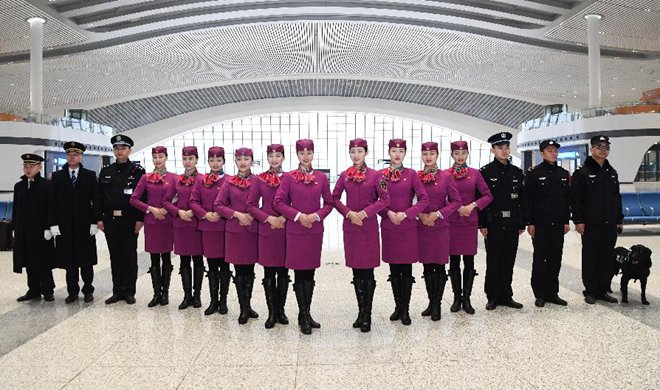BEIJING, Jan. 17 (Xinhua) -- About a year ago, a man surnamed Song, a programmer in Shenzhen, received a mysterious call and lost 280,000 yuan (43,460 U.S. dollars) via Alipay, one of China's most popular online payment platforms. This was odd as Song did not have a single penny in his Alipay account.
It turned out the swindlers had taken three steps to transfer his loan via Alipay's micro-loan provider Ant Micro.
Almost at the same time, about 1,400 km away, Lin Liangquan rushed to the police department, reporting that more than 27 million yuan missing from his company account in Haining City, east China's Zhejiang Province.
Lin said a stranger called up and faxed a wanted poster, claiming the company had been involved in a pyramid scheme and demanded an immediate check of their bank accounts. A malware program was later implanted and the vast sum of money was soon transferred via multiple third-party payment platforms.
China has been cracking down on rampant online and telecom fraud in recent years. It has tightened the number of multi-function accounts a person can open and stipulated a "frozen time" of 24 hours for money transfer on ATMs. However, third-party payment platforms have emerged as a leading method for fraudsters to bypass such obstacles.
The Public Security Bureau of Beijing said that since 2015 up to 70 percent of stolen money has been scammed through third-party payment platforms. In the first three quarters of 2017, the anti-fraud center in Shenzhen had frozen more than 9,800 suspected accounts, retrieving 315 million yuan.
"The money recovered was only a small fraction, most of it was untraceable," said Wang Zhengtu at the center. "It was easier to track the flow of money when most transactions were done through bank cards. But now, the swindlers first transfer the money to third-party payment platforms before putting it into their bank accounts. These platforms are like a big pool, it is almost impossible to track its origin," Wang said.
It is estimated that over 20 trillion yuan of capital was transacted via third-party payment platforms in 2016. There are currently 270 licensed such platforms, and a large quantity are operating without proper qualifications.
"I bet no one could catch me if I were a swindler," a police officer said.
Many people have complained about the complex procedures and extremely long feedback period in dealing with online and telecom fraud cases.
Chinese banks now demand strict real-name registration in the application of bank cards, leaving almost no room for fraudsters. But opening an account on a third-party payment platform needs nothing much more than an email account. Moreover, a person can hold multiple accounts, making it the perfect channel to move money.
During police investigations, gathering evidence is very complicated.
Enquiries for online transactions from the company often need at least three days, more than enough for money to be transferred elsewhere. Fake IDs are often used for online registration, leaving the police little evidence.
Wen Yanbing, associate professor at Zhejiang University of Finance and Economics, said the government should improve the cybersecurity law to set up a cross-sector supervision mechanism to intensify the crackdown on fraud through third-party payment platforms. The authorities should also take the responsibility to supervise these platforms to improve regulation on registration and operation.
"Fake online information is the fundamental reason for rampant fraud," said Xu Shengjie with the Zhejiang Public Security Department. "Some small third-party payment platforms overlook system security and supervision, and this has offered opportunities for lawbreakers."
"Third-party payment platforms should be included in the investigation platform targeting telecom fraud set up by the Ministry of Public Security," said Wu Shenkuo, associate professor at Beijing Normal University. "Therefore, police can retrieve the account information and freeze the money immediately after the report."
"Companies running third-party payment platforms are often headquartered in first-tier cities such as Beijing and Shanghai, and it is hard for police in other regions to investigate. Therefore, a unified enquiry center should be established in every province and be connected to the national system to raise investigation efficiency," Wang said.

















